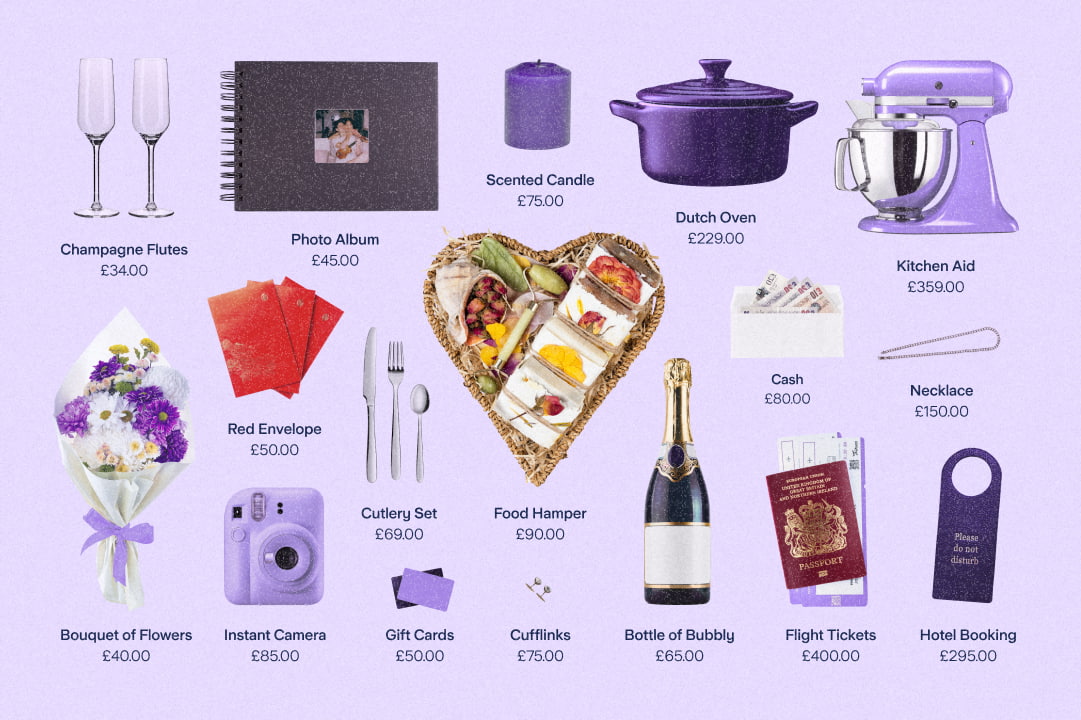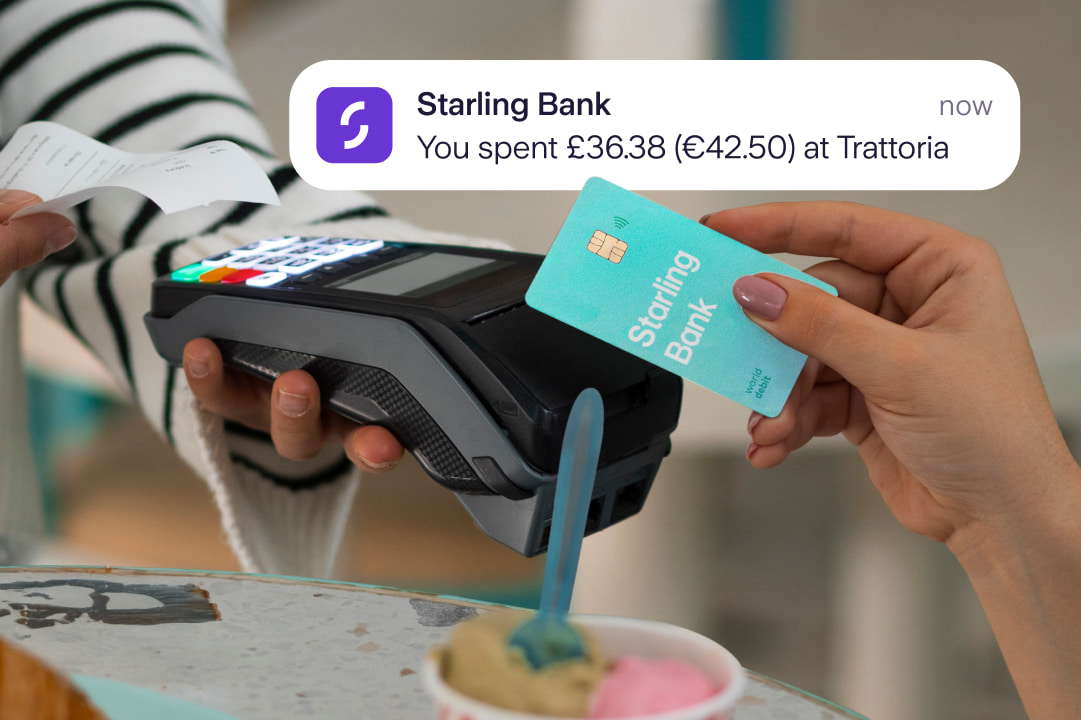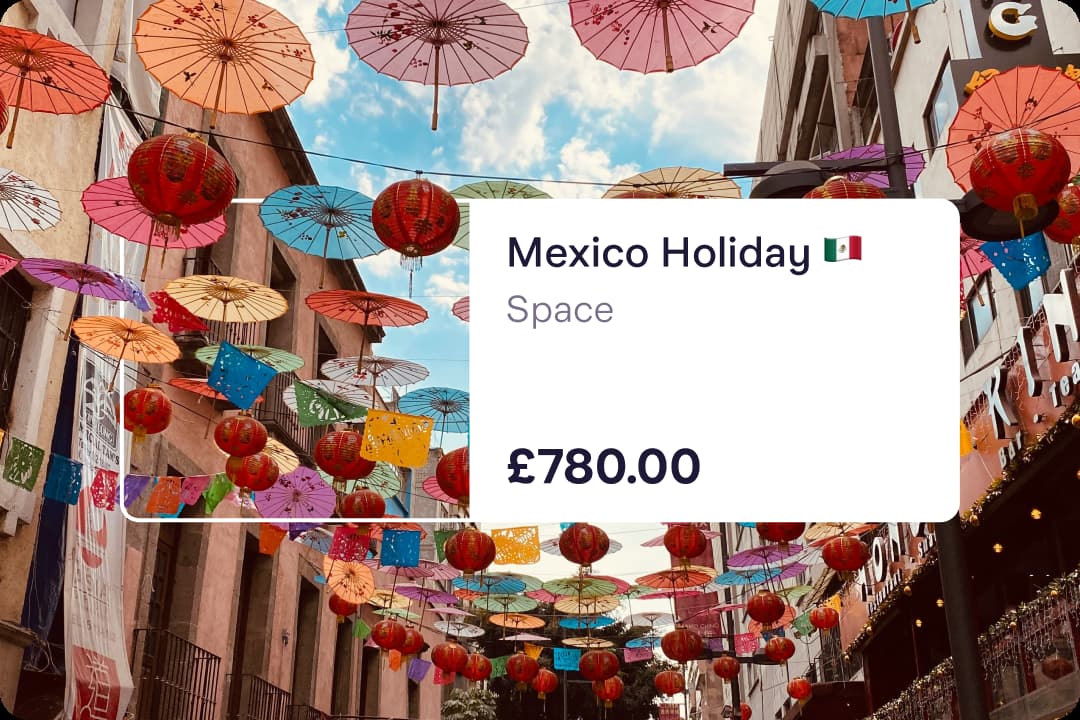
Property
Otegha Uwagba on homeownership
By Otegha Uwagba
Weddings

Is it crass to ask for cold, hard cash? Should we just stick to china sets? As modern couples’ priorities evolve, and the cost of tying the knot rises, wedding gift registries are changing too.
For couples getting married, costs start racking up long before they walk down the aisle. Starling’s survey of 1,001 British couples found that the average proposal costs £8,185 (including an average spend of £2,600 on the ring). The wedding itself costs the average UK couple £23,250, up 12% from 2023 to 2024. It’s also expensive for guests. Last year, attending a UK wedding cost £451 on average, including an average spend of £108 on a wedding gift. This is before you factor in stag and hen dos. Ouch.
All this means that defining a ‘proper’ or ‘appropriate’ approach to wedding gifts can be a minefield, especially for cross-cultural couples and mixed-race families – something I know first-hand. While some lovebirds treasure the sentimentality of physical gifts, others opt for honeymoon funds – or charity donations. Ahead of my wedding later this year, I want to know: are wedding registries still fit for purpose?
The original idea of a wedding gift registry is believed to have come from department store Macy’s in the 1920s. The registry allowed local couples to choose their favourite fabrics, china, and crystal patterns, and guests to shop from this list.
If a couple does a wedding registry today, they often use a specialised website with options from different brands. Some registries also allow guests to send money for a couple’s honeymoon or new home fund (which makes sense – a quarter of proposers dip into house deposit money to fund the proposal alone).
In Asia, and other places, cash gifts are what’s traditional. These come in the form of ‘red packets’ – special envelopes used to hold bank notes on occasions such as Chinese New Year. In Chinese culture, red symbolises good luck and happiness. You’ll also come across a ‘no boxed gifts’ rule for some Indian and South Asian weddings, in favour of cash contributions.
Typically, the idea of receiving banknotes in an envelope from a guest makes Brits squirm. Even a honeymoon fund makes lots of couples uncomfortable, even though a physical gift registry, where all the prices are displayed, isn’t all that different – especially as the couple can return a physical gift in exchange for cash without the gifter finding out.
So why do so many British couples resist the idea of cash contributions over physical gifts? And describe it as “icky”, “uncouth” or “crass”? Well, there’s the risk that requests for cash are interpreted as couples recouping the cost of a wedding by asking guests to ‘pay their way’.
And then there’s the fact that many guests will pay a lot to be there for the couple’s big day, especially if the wedding is abroad.
For those who do opt for a honeymoon or new home fund, many seem keen to add layers of decorum around this, rather than simply sending over the details for their joint account, or a Settle Up link (for less than £250) if they bank with Starling.
Couples seem to feel more ‘polite’ when asking for money through a beautifully designed website that breaks down various elements of their honeymoon, even though this comes at a cost – platforms often charge processing fees of around 2%.
£8,185 (rising to £10,989 for the average Londoner)
This equates to just over three months’ salary, meaning the average proposer saves up for nine and a half months to make it happen
42% book a photographer to capture the moment (average cost £1,177) and just over a quarter (26%) book a videographer (average cost £1,136)
Other costs include booking a venue (average cost £1,553), paying for accommodation (average cost £1,229 for a UK proposal) and sorting outfits, hair and make-up (average cost £1,190)
60% feel pressure to make the moment ‘perfect’, and 71% say social media had an impact on their proposal
The knock-on effect of a proposal means that: 14% have less to spend on the wedding and 12% have less for the honeymoon
If your proposal includes various elements (engagement ring, venue, photographer etc.), why not set up different Spaces for each one? This is the tool Starling customers can use to set money aside from their main balance and choose a target amount.
What’s strange is that this ickiness around experience-based gifts seems to be specific to weddings. Would you balk at a gift voucher for a gorgeous restaurant or massage? Or is the ickiness all because of the ‘asking’, even if all you’re doing is telling people what you’d like?
“Asking for what you want often feels unfamiliar or uncomfortable,” says counsellor and psychotherapist Lucie Galt. “Take asking for a pay rise – that’s never an easy conversation to have, even if you deserve it. A gift registry is a mass request for things you’d like – it’s not personal like a text from an uncle asking what you’d like for your birthday. The scale is different, which means the scale of the discomfort is different. The tradition of a physical gift registry can soothe this – ‘it’s the done thing’ – but a honeymoon or new home fund is a much newer concept, which again adds to the discomfort.”
Her advice? “Remember the joy of giving. Provided people don’t feel ‘expected’ to give you something, they will be so happy to choose something from your list or contribute to your honeymoon fund – confident that it’s exactly what you want.”
So, what do I make of all this as a mixed race (half-Irish and half-Thai) woman engaged to a mixed race British man? Well, my Asian heritage means I will likely receive ‘red packets’ from Thai family members. While our Irish and British grandparents may insist on giving us physical wedding gifts.
With this in mind, our plan is to go for a ‘hybrid’ approach by using the platform Prezola, which enables us to include ‘experience-based gifts’, such as hotel vouchers and travel gift cards, alongside physical gifts and dedicated cash funds (we’ll then do a transfer from Prezola over to my Easy Saver so this money can build up interest*). The Wedding Present Company and The Wedding Shop also allow couples to take this hybrid approach.
Given that many of our family and friends are travelling to celebrate our wedding with us, we want to make it clear that we don’t expect anyone to contribute anything additional. For us, bringing everyone we love together for the wedding itself is always going to be the main event. Who could ask for anything more?
*AER 3.85%; gross variable interest 3.68% - rates accurate as of 16th May 2025. Terms and conditions apply. Personal current account required. Interest paid monthly. Gross is the contractual rate of interest payable before the deduction of income tax; AER stands for Annual Equivalent Rate and illustrates what the interest rate would be if interest was paid and compounded once each year.
The article above includes general information and should not be taken as financial advice. If you have questions about your specific circumstances, please speak to an independent financial advisor.
If you’ve got a summer of weddings coming up, plan ahead with Spaces – set money aside for your accommodation, taxi and gift.
Learn more about Spaces
Property
By Otegha Uwagba

Money truths
By Justin Quirk

How Much Does It Cost?
By Hannah Summers

Group holidays
By Kat Storr